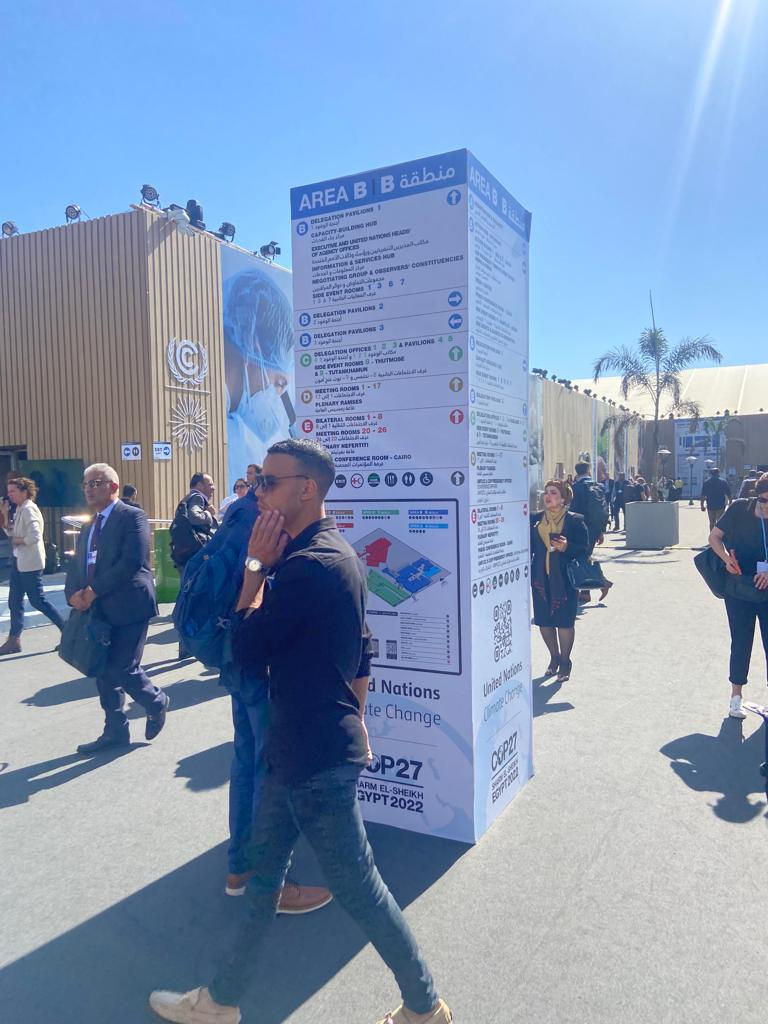I’ve just arrived back from #COP27 where the sheer scale and expanse of the event, across multiple building sites, rising out of the desert was quite an amazing experience, and one that I won’t forget in a hurry.

Overall COP27 was a circus of extremes; genuinely well organised, helped by the warmth and patience of the locals who couldn’t be more accommodating and welcoming. It took at least a day to orientate myself and I overheard many others saying they were lost too, which was a relief. From slick, formal events to quiet corners of knowledge sharing, demonstrations of political power and humbling on site protests by youth and citizens of disenfranchised countries – the energy was incredible, and I felt very humbled to have been there and work within the climate change sector.
Being at COP, you can really feel the enormity of climate action and the growing momentum for change. COP27 really did reinforce the urgency of the climate emergency, and showcased the regulation, skills, finance and speed urgently needed to transform the future of our planet.

The delegation of COP itself is made up of a mixture of opportunists, green-washers, protestors, NGO’s large and small, major corporates, countries, young people and smaller groups of vulnerable communities sharing story. It felt bigger than than Glasgow COP26 in terms of the number of organisations showcasing insights and solutions and the ground swell of people with a clear message for all to collectively and urgently change. However, unlike Glasgow, which was run in the city centre, it felt there were far less outsiders and visitors to COP coming to learn and show support. Sharm was more like an echo chamber made up of ambitious changemakers all talking to one another.
Like most who attend COP, I’m already converted, therefore there are a series of key question that we need to ask.
Beyond the negotiations happening behind closed doors, and the number of relationships and collaborations made during the fortnight (which is crucial to make things happen), how do we ensure learnings and attitudes are cascaded to the rest to the population?
How do we ensure we achieve the outcomes set out and that the impact of COP is felt beyond those in attendance?
How do we get to true implementation and behaviour change and to ensure that there is a mentality that climate action is required by everyone not just a fortnight in November not just for a shortlisted, privileged few?
How do we make sure that promised and commitment made become reality?
It’s fair to hold a degree of cynicism for any event of this scale, not just COP. The debate about the actual purpose of COP and its own carbon footprint, number of planes and private jets used and the almost zero plant-based catering options are conversations that need to be had. Post pandemic there is the valid argument to suggest that we don’t really need to have face to face conversions to get results anymore. However, when I stumbled across a stand where panel members and the audience were crying whilst sharing stories of lives and livelihoods lost due to climate change, I had a massive personal wakeup call and a much-needed reminder of what loss and damage really means. I wouldn’t have dropped into that session if it was virtual, and I would not have learned or felt what I did that day if I hadn’t been there in person.
There was a good number of membership organisation present at COP from around the world, which was great to see. Most were involved as part of an alliance for change or guest speakers on panels. It was great to see the power of collaborations and cross sectoral connections at work. I would have liked to see more representation of specific business and industry groups at COP from around the world, especially SME’s. I felt an obvious lack of presence of SME’s at Glasgow too.

I feel compelled to do something about this. I see a greater role for Climate Action for Associations (CAFA), working in collaboration with other bodies representing industry, systems and supply chains to effect change. If CAFA are a part of COP28 in Dubai 2023, our aim would be to increase impact and representation of the valuable contribution industry groups and their small business members are having to ensure the 1.5o ambition stays alive. One of the most welcome business announcements at COP27 was the launch of the ISO climate standard guidelines to ensure consistency across the board on what ‘Net Zero’ really means and CAFA looks forward to embracing the guidelines as part of our Net Zero Association Carbon Measurement & Reporting Service.
I'll be praying for positive outcomes and some true Breakthroughs from the official negotiations but so far, I’m not holding my breath. There are so many reasons to remain optimistic but there is only so much business and industry can do without clear regulation and strong policies in place. It is also here, driving policy, regulation, skills and standards that professional bodies and trade associations can play a strong role and CAFA will continue to support you in doing so and fine tune our help to Associations in the race to zero 2030 challenge to associations.
For more information about Climate Action for Associations and how we can help your membership organisation transition contact myself, Alison Heppenstall, ali@cafacollective.org or Mehak Sudan mehak@cafacollective.org.

Comments